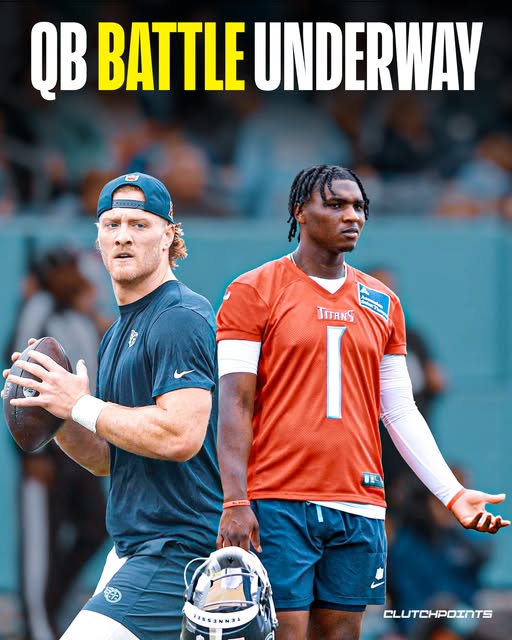The Tennessee Titans have long been one of the most intriguing teams in the NFL when it comes to quarterback situations. This offseason, the spotlight shines brightly on Nashville, as the franchise embarks on a rare and highly competitive journey to determine the future signal-caller for the team. With Cam Ward, the freshly minted No. 1 overall pick in the recent draft, and the returning starter Will Levis splitting reps evenly throughout offseason activities, the Titans have made it abundantly clear: they are fully embracing a quarterback competition of significant magnitude.
The competition between Ward and Levis is not just a typical offseason drill. It’s a carefully calculated and deliberate move by the Titans’ coaching staff and front office, signaling their intent to find the best fit for their long-term offensive identity. The fact that these two quarterbacks are sharing reps in an almost equal measure demonstrates the open-mindedness and commitment the franchise has toward fostering competition. This approach aims to push both players to elevate their games while allowing the coaches to observe their development under live-action conditions during practice.
Cam Ward, coming out of college as the No. 1 overall pick, carries enormous expectations on his shoulders. Being selected first overall in the NFL draft is a rare honor, often reserved for players deemed to have franchise-altering potential. Ward’s collegiate career was marked by exceptional arm talent, mobility, and a strong football IQ — traits that have earned him comparisons to some of the game’s elite quarterbacks. However, transitioning from college to the professional ranks is never seamless, even for the most highly touted prospects. The Titans’ decision to give Ward a significant amount of reps early on suggests they believe he is capable of handling the pressure and learning quickly enough to potentially lead the team sooner rather than later.
On the other side of the competition is Will Levis, the returning starter who has already experienced NFL game action. Levis represents stability, familiarity with the Titans’ offensive system, and a growing body of experience that can’t be overlooked. While his rookie season had its ups and downs, Levis showed flashes of promise with his arm strength, ability to make plays under pressure, and leadership on the field. The coaching staff’s willingness to split reps evenly with Levis indicates a respect for what he has accomplished and a belief that he remains a viable candidate to guide the team moving forward.
This offseason competition is significant not just because it pits two talented quarterbacks against each other, but because it embodies the evolving philosophy of the Titans’ organization. In recent years, NFL teams have increasingly embraced open competitions at the quarterback position to foster accountability, ignite player development, and identify the best fit for the team’s offensive identity. The Titans’ approach this year reflects a willingness to disrupt the status quo, signaling that no player is guaranteed the starting job until they earn it through performance and consistency.
One of the most compelling aspects of this competition is the challenge it presents to both Ward and Levis. Each player brings a distinct skill set and personality to the table, forcing coaches to weigh different factors when determining the starter. Ward’s athleticism and raw talent offer the potential for explosive plays and dynamic offensive schemes, but also come with a learning curve typical of rookies adjusting to the speed and complexity of the NFL. Levis, by contrast, offers a steadier, more experienced presence but must prove that he can continue to improve and overcome the typical growing pains faced by second-year quarterbacks.
The intensity of this quarterback competition extends beyond just practice reps. Both players are being evaluated on their grasp of the Titans’ playbook, decision-making under pressure, chemistry with teammates, and ability to lead in the locker room. The coaching staff is paying close attention to how each quarterback handles adversity, adapts to coaching, and contributes to the overall culture of the team. These intangible qualities often differentiate good quarterbacks from great ones, and the Titans want to ensure they choose a leader who can inspire and elevate the entire roster.
Fans and analysts alike are watching this competition with great interest, recognizing that the outcome could shape the trajectory of the Titans franchise for years to come. The team’s commitment to an open competition sends a message of high standards and a refusal to settle for anything less than the best quarterback on the roster. It also reflects a modern NFL trend where quarterback competitions are not just offseason formalities but intense battles that can redefine careers.
The implications of the Ward-Levis battle go beyond just the immediate season. If Ward wins the starting job, it would validate the Titans’ decision to draft him first overall and mark a significant step in his development as a franchise quarterback. Such a scenario would also highlight the team’s confidence in Ward’s potential to be a cornerstone of their offense for years, capable of elevating the Titans to championship contention. On the other hand, if Levis secures the job, it would demonstrate the value of experience and continuity, suggesting that the team believes Levis has what it takes to lead them while Ward continues to develop behind the scenes.
Another important aspect to consider is how this competition influences the rest of the Titans’ roster and coaching strategies. Having two quarterbacks competing at a high level pushes offensive coordinators to design plays that highlight each player’s strengths, making the offense more versatile and dynamic. It also creates an environment where every player on offense must stay sharp and adaptable, knowing that the quarterback situation is fluid and that success depends on collective execution.
The coaching staff, led by head coach Mike Vrabel, is embracing this challenge with a pragmatic and transparent approach. Vrabel understands the importance of quarterback play in today’s NFL and is committed to making an objective decision based on merit. His leadership throughout this process will be crucial in maintaining team unity and ensuring that both quarterbacks feel supported, even as they compete fiercely. Vrabel’s ability to manage this competition will be a defining factor in the Titans’ success this season.
Furthermore, the team’s front office deserves credit for creating an environment that values competition and development. By investing the No. 1 overall pick in Ward, the organization has demonstrated a long-term vision and commitment to building around a potential franchise quarterback. At the same time, by giving Levis a fair chance to reclaim or retain the starting job, the front office shows respect for performance and growth, reinforcing a culture of meritocracy.
From a fan perspective, this quarterback competition has generated excitement and anticipation for the upcoming season. It’s rare to see two players with such contrasting backgrounds and skill sets battle it out with equal opportunity from the start. The storyline adds an extra layer of intrigue to Titans practices and preseason games, where every snap could influence the final decision. Fans are eager to see who will emerge as the leader and how the team’s offense will evolve under their guidance.
In conclusion, the Tennessee Titans’ decision to split reps evenly between No. 1 overall pick Cam Ward and returning starter Will Levis during offseason activities is a bold and strategic move that highlights the team’s commitment to finding the best quarterback for their future. This full-blown competition in Nashville is about much more than just practice reps; it represents a philosophy of accountability, development, and meritocracy that could shape the franchise’s trajectory for years to come. Both Ward and Levis bring unique strengths and challenges to the table, and their battle for the starting job will test their skills, leadership, and resilience. As the offseason progresses, the Titans and their fans will be watching closely, knowing that this competition could define the team’s identity and success in the seasons ahead.



